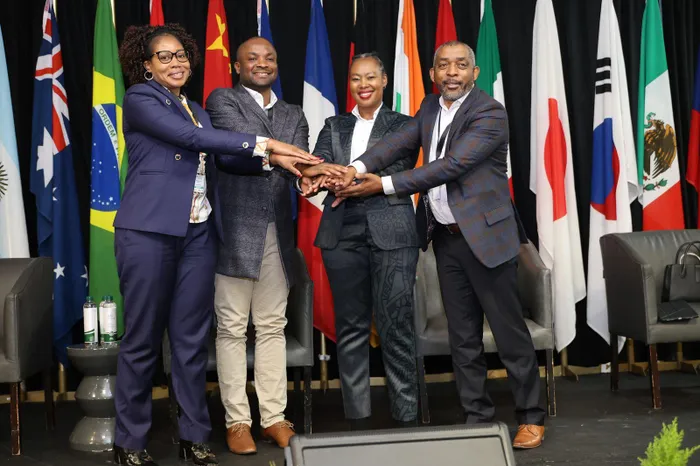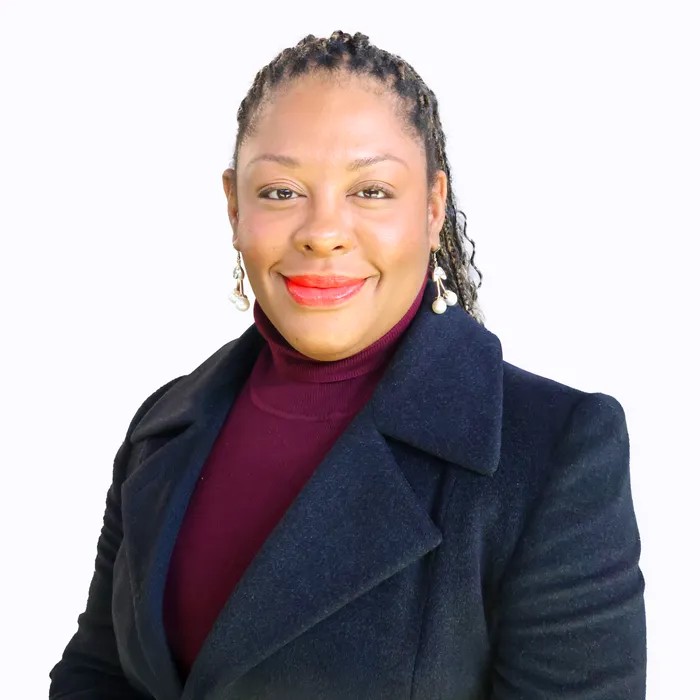
(From left to right) Salomi Baloi, DIRCO Acting Chief Operations Officer and Lead Coordinator – G20 Engagement Groups; Kizito Okechukwu, Executive Head of 22 On Sloane and Co-Chair of the Global Entrepreneurship Network (GEN) Africa; Honourable Minister Stella Ndabeni-Abrahams, Minister of Small Business Development and Vuyani Jarana, Chairperson - SU20 South Africa.
Image: Supplied
The Startup20 (SU20) midterm engagement was, by all accounts, a success. It brought together taskforce members, youth leaders, global partners, and policy stakeholders in a high energy environment designed to move beyond rhetoric and into action. There was a shared sense of urgency and commitment to shaping meaningful, global policy proposals ahead of the G20 Summit in November.
In her address, Minister of Small Business Development Stella Ndabeni-Abrahams highlighted the significance of South Africa’s G20 Presidency under the theme "Solidarity, Equality and Sustainability," calling for urgent reform of global trade and financial systems to better serve vulnerable economies and communities. She stressed the importance of Micro, Small and Medium Enterprises (MSMEs) in driving inclusive growth, innovation, and resilience, particularly within underserved rural and township communities. The Minister underscored the need to ensure MSMEs are not afterthoughts in policy, but rather strategic actors in economic development. She reaffirmed South Africa’s proposal to establish a formal G20 MSME and Startup Working Group, positioning this as a potential legacy of the current G20 cycle.
At its core, the gathering was a working session. It included breakout groups to refine taskforce policy drafts, synergy mapping across themes, panel discussions with key experts, and collaborative dialogue that challenged participants to think not only about what we say in policy, but how we say it. This was not a passive conference; it was a space of co-creation.
After the midterm engagement, I’ve found myself reflecting not only on what we are building, but how we are building it, and most critically, how we are speaking it into being.
Language in policy is not neutral. It can build coalitions or break them. It can open doors or slam them shut. It is a tool of inclusion and imagination, but also, at times, of division and misunderstanding.
This became abundantly clear when one task force, in passionately critiquing restrictive global frameworks, used the term “regulatory colonialism.” The intention, I believe, was to spotlight the disproportionate burden placed on African and Global South economies by rigid, one size fits all regulations imposed or incentivised by dominant global actors.
In a space that aims to co-create solutions across the G20 and beyond, this word landed with the force of centuries.
And here lies the tension.
Africa has a long and painful history of linguistic erasure and imposed narratives. To reclaim language is to reclaim power. But we must also acknowledge the tightrope we walk in multilateral spaces, where the very policies we craft must be legible, palatable, and adoptable by stakeholders who do not share our histories.
Terms like “regulatory colonialism” may resonate deeply within African contexts. But they risk alienating potential partners or diluting the intended message if the room becomes stuck debating semantics instead of substance.
This is not a call to silence bold language. On the contrary, it is a call to wield it strategically. Disruptive language can reframe and rehumanise policy. But to be effective, it must be grounded in clarity, in invitation, and not just indictment.
What I’ve come to understand, perhaps even more acutely after this engagement, is that being disruptive with language is both an art and a responsibility. In a policy context, especially one as nuanced and high stakes as SU20, words must do double duty: they must challenge, and they must connect.
We cannot afford to dull our messages into soft diplomacy. But we also cannot allow our most powerful insights to be lost in translation, or worse, rejected outright because of a single triggering phrase.
The question is not whether to be disruptive it is how to be disruptive while remaining heard. How to honour our truths while expanding our reach. How to challenge systems while building the coalitions needed to change them.
In the end, we must ask ourselves: are we speaking to be right, or are we speaking to create change? Because in spaces like SU20, our words don't just pronounce the world—they have the power to reshape it.

Boitshoko Shoke, Research and Impact Manager at 22 On Sloane.
Image: Supplied
Boitshoko Shoke, Research and Impact Manager at 22 On Sloane.
*** The views expressed here do not necessarily represent those of Independent Media or IOL
BUSINESS REPORT